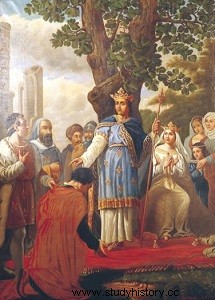
The day after his majority, he had to face new revolts from the great barons. A first attempt, led by Thibaud de Champagne and Pierre Mauclerc, was just a flash in the pan. But more formidable is the movement in 1241 triggered by Hugues de Lusignan and his wife Isabelle, widow of Jean sans Terre and mother of the King of England.
The uprising very quickly spread to the entire South-West and South region and, when the Count of Toulouse, foreseeing a revenge for his humiliations, threw himself into the adventure, always with the support of England, one can believe in a revolt of the whole South under his direction. In reality, Louis IX came very quickly to the end of this new coalition.
After having invaded the domains of the Lusignans, he defeated the English under the walls of Saintes (July 1242). Then he directed his efforts against the Count of Toulouse, whose forces were still intact but who, soon discouraged by the defection of the Count of Foix, decided to rely on the clemency of the king.
He obtained peace at Lorris in January 1243, on condition that he respect the treaty of 1229 and solemnly undertake to pursue heretics and chase them from his lands. It was then that the Roman Inquisition* made its appearance in France. But it will always remain under the king's hand.
“Since that time, said Guillaume de Nangis, the barons of France ceased to do anything against their king. »
The expedition of 1242 is, in fact, the last act of energy that French royalty must show in the 13th century against the high nobility of the fiefs acquired or dismembered by Philippe Auguste and Louis VIII.
From then on, Saint Louis could devote himself to the government of the kingdom. He does this with wisdom and authority, intending to make a “moral order” reign everywhere. Investigators are sent to officers, bailiffs and seneschals to repair royal injustices, and the ordinances of 1254 and 1256 outline the duties of officers, in order to avoid exactions, bad customs, corruption. But these measures were also intended to reinforce the royal authority and, in this enterprise, the prestige and the aureole of holiness with which the monarch is surrounded singularly facilitate his task.
In accordance with the prescriptions of the fourth Council of Lateran, it abolishes the judicial duel and the private war (1258), makes other ordinances against prostitution, gambling, blasphemy. This moralizing tyranny is not accepted without murmurs, however. She arouses in her entourage a sad reprobation. The king also exalts the justice he willingly renders himself, most often seated under an oak tree in the park of Vincennes, an image that will become legendary.
Louis is no less concerned about the finances of the kingdom. He had the first French gold coins minted, the gold crowns, with the motto:Christus regnat, Christus vincit, Christus imperat, and the ordinances of 1262 and 1265 gave royal currency legal tender throughout the kingdom.
The Feudal Court was also transformed under his impulse. Some of his sessions are soon devoted exclusively to court cases, others to controlling the financial management of officers and updating accounting. Thus are born the parliament and the Court of Auditors.
The prestige of Saint Louis was further increased by the economic prosperity experienced by the kingdom under his reign, the artistic (Gothic art) and intellectual (brilliance of the University of Paris) influence which emanated from it, but to which he himself did not interested only in pious ways:construction of the Sainte-Chapelle to house the Sainte Épine, conversations with the learned theologian Robert de Sorbon to whom he nevertheless preferred the mediocre compiler Vincent de Beauvais. His reign is ultimately a happy, beneficial reign, which will leave the memory of a "beautiful era", the "good times of Monsignor Saint Louis"
